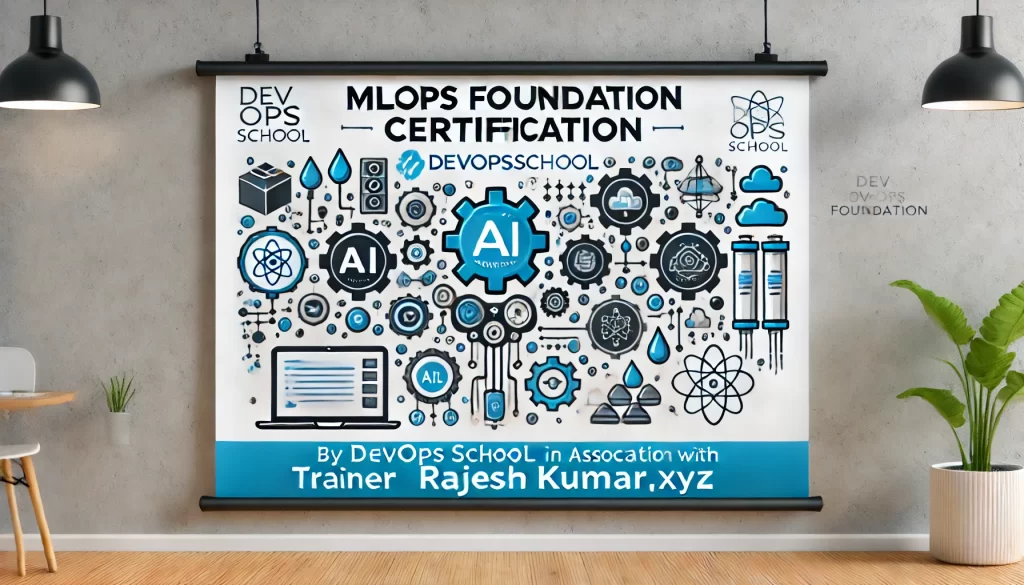
In the fast-evolving world of Artificial Intelligence (AI) and Machine Learning (ML), building, deploying, and maintaining machine learning models in production environments presents numerous challenges. MLOps, a combination of machine learning and operations, addresses these challenges by bringing DevOps principles to machine learning workflows, ensuring continuous integration and deployment of machine learning models. To help professionals build a strong foundation in MLOps, DevOpsSchool, in collaboration with expert trainer Rajesh Kumar from RajeshKumar.xyz, introduces the MLOps Foundation Certification. This blog post covers the comprehensive agenda, topics, and key details of the certification to guide students on their MLOps journey.
1. What is MLOps?
- Definition: MLOps, short for Machine Learning Operations, is a set of practices that brings together machine learning, DevOps, and data engineering to automate and streamline the lifecycle of machine learning models.
- Why MLOps is Important: MLOps ensures that machine learning models are integrated into production systems smoothly, addressing common challenges such as reproducibility, scalability, monitoring, and compliance.
- Evolution of MLOps: MLOps evolved from traditional DevOps practices but adds an extra layer of complexity because machine learning models are often dynamic, data-driven, and require continuous monitoring and retraining.
2. Overview of MLOps Foundation Certification
- Certifying Body: The MLOps Foundation Certification is provided by DevOpsSchool, in collaboration with Rajesh Kumar, a leading expert in both DevOps and AI/ML technologies.
- Target Audience: This certification is perfect for data scientists, machine learning engineers, DevOps professionals, software engineers, and anyone interested in automating and streamlining machine learning workflows.
- Prerequisites: While not mandatory, a basic understanding of machine learning concepts and DevOps practices is beneficial for the participants.
3. Why Pursue MLOps Foundation Certification?
- High Demand for MLOps Skills: With AI and ML becoming integral to modern business strategies, MLOps skills are in high demand for ensuring the deployment and management of ML models.
- Practical, Hands-on Learning: This certification equips you with hands-on knowledge of implementing MLOps practices using industry-standard tools and workflows.
- Career Growth: Certified MLOps professionals are highly sought after, offering opportunities for roles such as MLOps Engineer, Machine Learning Engineer, and Data Operations Specialist.
4. Certification Agenda and Key Topics
The MLOps Foundation Certification offers a comprehensive curriculum that covers every aspect of machine learning operations, from model deployment to continuous integration and monitoring. Below is the detailed agenda for the course:
A. Introduction to MLOps
- What is MLOps?: A detailed introduction to MLOps, its role in machine learning lifecycles, and how it integrates with DevOps practices.
- MLOps vs DevOps: Understanding the differences between MLOps and traditional DevOps workflows, and how MLOps brings a data-centric approach to operations.
- Challenges in Machine Learning Operations: Key challenges in deploying and managing machine learning models, including versioning, reproducibility, scalability, and automation.
B. Key MLOps Practices
- Version Control for Data and Models: How to version datasets, code, and machine learning models to ensure reproducibility and traceability.
- CI/CD for Machine Learning: Understanding Continuous Integration (CI) and Continuous Delivery (CD) in the context of machine learning pipelines, from data preprocessing to model deployment.
- Model Monitoring and Retraining: Learn how to monitor model performance in production and set up automatic retraining pipelines when models degrade over time.
C. Tools and Technologies in MLOps
- Machine Learning Frameworks: Overview of popular ML frameworks like TensorFlow, PyTorch, and Scikit-learn used for building machine learning models.
- MLOps Tools: Introduction to tools like Kubeflow, MLflow, TFX (TensorFlow Extended), and DVC (Data Version Control) that streamline MLOps processes.
- Containerization and Orchestration: Learn how Docker and Kubernetes are used for deploying machine learning models in scalable and reproducible environments.
- Cloud Platforms for MLOps: Exploring cloud platforms such as AWS SageMaker, Azure ML, and Google AI Platform that offer managed MLOps services for production-grade machine learning workflows.
D. Data Engineering for MLOps
- Data Preprocessing and Feature Engineering: Key data preparation techniques to ensure your data is clean, standardized, and ready for machine learning workflows.
- Data Pipelines and ETL: Building automated pipelines to ingest, clean, and process data for machine learning models using tools like Apache Airflow and Kafka.
- Data Management in MLOps: Best practices for managing large datasets in production environments, including data versioning, cataloging, and governance.
E. Model Deployment and Infrastructure Management
- Model Deployment Strategies: Different strategies for deploying machine learning models, including batch prediction, real-time inference, and serverless deployment.
- Infrastructure as Code (IaC): Using tools like Terraform and Ansible to manage the infrastructure needed for machine learning workflows, ensuring scalability and reliability.
- Serverless MLOps: Learn how serverless platforms such as AWS Lambda and Google Cloud Functions can simplify the deployment of lightweight machine learning models.
F. Monitoring, Logging, and Auditing in MLOps
- Monitoring Models in Production: Techniques for monitoring model performance, including detecting data drift, model decay, and model fairness.
- Logging and Metrics Collection: Setting up logging and metrics collection pipelines to track model predictions, data inputs, and overall performance using tools like Prometheus and Grafana.
- Auditability and Compliance: Ensuring your machine learning models and workflows comply with regulatory requirements by setting up automated audits and maintaining model transparency.
G. Security and Governance in MLOps
- Securing Machine Learning Pipelines: Learn best practices for securing your machine learning pipelines, including access control, data encryption, and infrastructure security.
- Model Governance: Understand how to manage model risk, ensure fairness in predictions, and establish accountability for deployed models.
- Ethics in Machine Learning: Explore the ethical considerations in deploying machine learning models, particularly in sensitive areas like healthcare and finance.
H. Collaboration Between Data Scientists, DevOps, and Engineers
- Building Cross-Functional Teams: Best practices for fostering collaboration between data scientists, ML engineers, and operations teams to ensure smooth model deployment and monitoring.
- Shared Responsibility for Model Performance: Creating a culture where data scientists and engineers work together to monitor and improve models post-deployment.
- Blameless Postmortems: Learn how to conduct postmortems on model failures without assigning blame, improving processes and tools for future deployments.
5. Exam Preparation Tips
- Focus on Core Concepts: Ensure you understand the fundamental concepts of MLOps, including CI/CD for machine learning, model versioning, and monitoring.
- Hands-on Experience: Gain practical experience by using tools like Kubeflow, MLflow, and Docker to build machine learning pipelines and deploy models.
- Attend Live Sessions: Leverage the live training sessions conducted by Rajesh Kumar to clear doubts and learn from real-world MLOps use cases.
- Join MLOps Communities: Engage in discussions with other MLOps professionals in online communities to stay updated on best practices and new technologies.
6. Certification Exam Details
- Format: The certification exam is an online, multiple-choice test that evaluates your understanding of MLOps concepts and tools.
- Duration: The exam typically lasts 60 to 90 minutes.
- Passing Criteria: A minimum score of 70% is required to pass the exam and receive the MLOps Foundation Certification.
- Recertification: Given the rapidly evolving nature of MLOps tools and practices, recertification is recommended every two years.
7. Conclusion: Why Choose MLOps Foundation Certification?
The MLOps Foundation Certification by DevOpsSchool, led by Rajesh Kumar, provides a solid foundation for individuals looking to implement machine learning models in production environments. Whether you’re a data scientist, DevOps professional, or software engineer, this certification equips you with the knowledge and tools needed to automate machine learning workflows, monitor model performance, and ensure reproducibility at scale. With MLOps becoming a critical skill in today’s AI-driven world, this certification is a key step in advancing your career.






Leave a Reply
You must be logged in to post a comment.